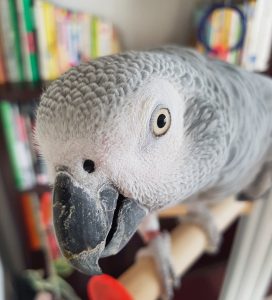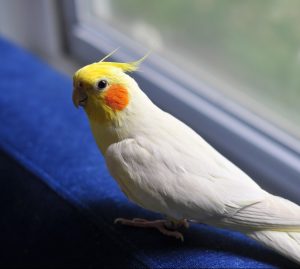
Due to the recent pandemic many people are having to stay home from work, school and other social activities in order to reduce the chances of coming into contact with and spreading the COVID-19 disease. Although this social distancing from other people may be difficult it can also be thought of as an occasion to spend a little more time with our feathered friends and other pets.
As pet owners are at home and observing their birds at times where they may not normally, they may discover that their birds tend to follow routines daily, just like we do! In the morning when we get up many of us follow the same tasks right on a schedule without even meaning to. Stretching, showering, eating breakfast, drinking coffee, reading the newspaper or online news sites. All these behaviors we do are almost ritualistic! We often don’t stop to think that a lot of the things we do are routine and happen at certain times, but they do.
Birds Have Routines Too!
During a typical work week, when people are rushing to get out of their homes, they may not recognize that their animals actually maintain habits and rituals as well. They too will do things at certain times or in a particular order routinely.
This behavior of birds sticking to routines and habits is actually an innate behavior that can be observed in wild birds. Naturalists know that there are certain times of day to see birds doing activities and behaviors. Guides for visitors of the rainforest understand that in order to observe wild parrots at clay licks they need to be there first thing in the morning. If the weather is good, birds will fly in like clockwork to be at the clay licks early. Going later in the day is not going to guarantee any parrots will be seen. Equally as routine, birds can be observed to be roosting or foraging at certain times. Social times are also restricted to particular parts of the day. This type of habitual behavior is important for birds to maximize their daily tasks and its something that pet birds want to innately abide by as well.
For my own flock, my Amazon parrot comes with me to work so I get to watch his daily habits and I know his routine well. He wakes up at about 6:15 a.m., stretches his wings, then likes to come out on his tree stand. He relaxes and grooms a little as I get ready. Then we head off to work and as he sits in his car seat he sings and dances to the music on the radio. Next, we get to work and he is ready for breakfast! As the day goes along, he greets clients that come into the hospital, forages in his cage, and plays with toys.
When lunch time rolls around he knows he is due for another treat. Following lunch, he is often napping for a couple hours but once 3:00 p.m. hits watch out! It’s time to sing, scream, and party! This goes on for an hour or two depending upon how he feels. Then once the workday comes to an end and it’s time for us to go home he loves to play a little game I like to call, “Hard to get.” He fluffs up his head feathers and slowly walks away from me as I ask him to step up. Then he may offer one foot, touch my hand, then rapidly pull it back and run away. He is flashing his eyes and really enjoying it. Eventually he steps up (sometimes with me encouraging him with a treat) and we get to go home. By 7 p.m. he is ready for bed. If he isn’t in bed by this time he gets cranky!
Your Bird’s Daily Do

What does your bird do throughout the day? Does he get up and immediately want to eat? Or does he like to relax and watch the sun rise? Is she vocal in the morning or maybe at other parts of the day? Is there a certain toy that she may want to interact with first or does she seem to have a more random pattern of playing? Watch your bird closely. You will likely be able to quickly identify a routine they tend to stick to with their tasks. It can even be fun to keep a small diary of their behaviors at certain times in the day and refer to it to see if you notice any trends.
This may all sound very mundane but there is a lot of value to knowing your pet bird’s habits. Their social nature and intelligent minds are primed to follow routines and if they don’t, it can be an indication there is something wrong.
For example, one day, one of my African greys was sitting in her cage and resting. She normally is very active and a little busy body, climbing around and exploring the floor. But not this day. At first, I didn’t think much about it because I was busy but by mid-day I happened to look into her cage and saw she had not touched her foraging toys. Now, I knew something was wrong. Not only was she not running around like typical, but she hadn’t foraged like she routinely would. I took her out of her cage and got a closer look only to find that she had fractured the tip of her beak! It was just a small break, but she was painful and it was throwing her whole day off. I quickly addressed the problem and got her feeling comfortable again. And wouldn’t you know it but within an hour she was back to her regular routines! Had I have not picked up on the change in her habits she could have been uncomfortable for longer.
What can you say about your bird’s routine behaviors? Do you know what times they eat, groom, nap and vocalize? Pay attention. Keying into your bird’s routines can allow you to be able to tell something is off sooner than a bird may want to truly show signs of a problem. Birds are masters of disguise and love to hide signs that they don’t feel great. They will often try to act normal until they just can’t compensate anymore and then start to act ill. By this time though problems may be much more advanced.
So, watch your bird’s behaviors. Take note of their routines and be observant of changes from normal. Picking up on very subtle alterations in customary habits can allow you to get any necessary care your bird needs sooner than if you wait till they start to really act ill. Sometimes, just taking your bird in to the vet because it seems “off” with its routines can help reveal problems early and allow for a much more rapid resolution of a problem. You can help get birds back to their happy, healthy, routine behaviors quicker by tuning into their habits and knowing when to reach out for help when things seem off.






How did you fix your bird’s fractured beak tip so the bird could eat?
The tip of the beak needed to be removed and then a patch was applied to the tip to cover the delicate nerve endings that can make the bird uncomfortable from this sort of injury. -Dr. Lamb
I have a cockatiel (Bisquit is her name) who is very loud when i leave the room. It doesn’t bother me but it does bother my wife. Is there anything I can do to quit Bisquit down.
I just love reading your article especially the part about you bringing your Amazon to work and his antics. I have two adorable parakeets that I love so much. Sadly I had to place my cockatiel with a neighbor who loves him so much too. Unfortunately I was allergic to him.
Do you cove your cockatiels cage? It might let him know not to scream. How about answering him from wherever you are — maybe a whistle? Or do as I talk to my bird to let him know you are in the house. (You don’t have to yell, they have excellent hearing.)